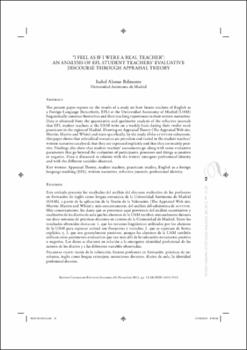I Feel as if I Were a Real Teacher”: An Analysis of EFL Student Teachers’ Evaluative Discourse through Appraisal Theory
Autor
Alonso Belmonte, IsabelFecha
2012Resumen
The present paper reports on the results of a study on how future teachers of English as a Foreign Language (henceforth, EFL) at the Universidad Autonomy of Madrid (UAM) linguistically construe themselves and their teaching experiences in their written narratives. Data is obtained from the quantitative and qualitative analysis of the refl ective journals that EFL student teachers at the UAM write on a weekly basis during their twelve week practicum in the region of Madrid. Drawing on Appraisal Th eory (Th e Appraisal Web site; Martin; Martin and White) and more specifi cally, by the study of the attitude subsystem, this paper shows that attitudinal resources are prevalent and varied in the student teachers’
written narratives analysed, that they are expressed explicitly and that they are mainly positive. Findings also show that student teachers’ assessments go along with some evaluative parameters that go beyond the evaluation of participants, processes and things as positive or negative. Data is discussed in relation with the writers’ emergent professional identity and with the diff erent variables observed Este artículo presenta los resultados del análisis del discurso evaluativo de los profesores
en formación de inglés como lengua extranjera de la Universidad Autónoma de Madrid
(UAM), a partir de la aplicación de la Teoría de la Valoración (Th e Appraisal Web site;
Martin; Martin and White) y más concretamente, del análisis del subsistema de actitud.
Más concretamente, los datos que se presentan aquí provienen del análisis cuantitativo y
cualitativo de los diarios de aula que los alumnos de la UAM escriben semanalmente durante
sus doce semanas de prácticas docentes en centros de la Comunidad de Madrid. Entre los
resultados obtenidos destacan: 1. que los recursos lingüísticos utilizados por los alumnos
de la UAM para expresar actitud son frecuentes y variados; 2. que se expresan de forma
explícita; y, 3. que son generalmente positivos, aunque los alumnos de la UAM también
utilizan otros parámetros evaluativos que van más allá de la valoración meramente positiva
o negativa. Los datos se discuten en relación a la emergente identidad profesional de los
autores de los diarios y a las diferentes variables observadas





